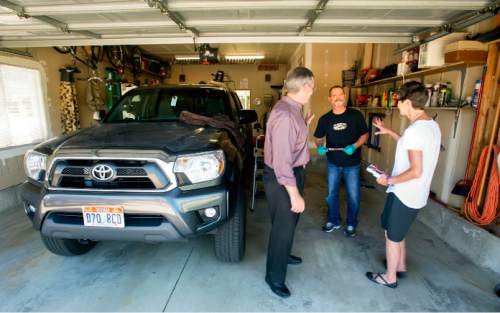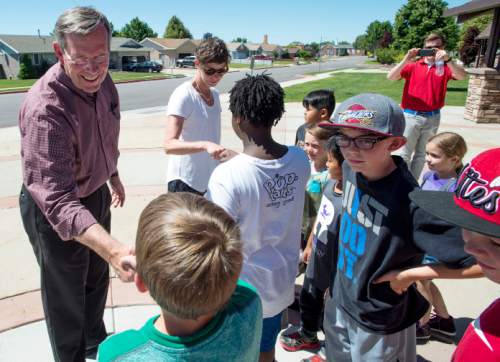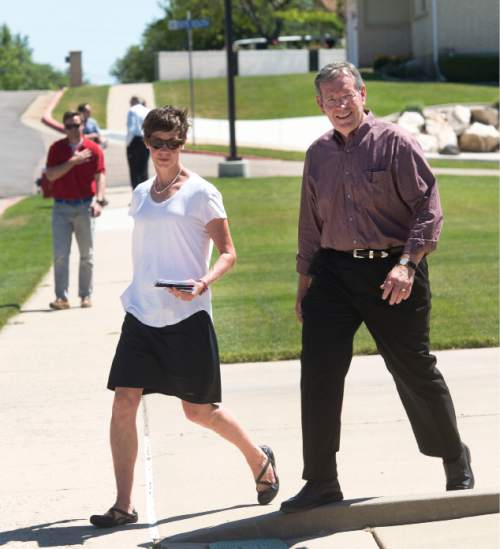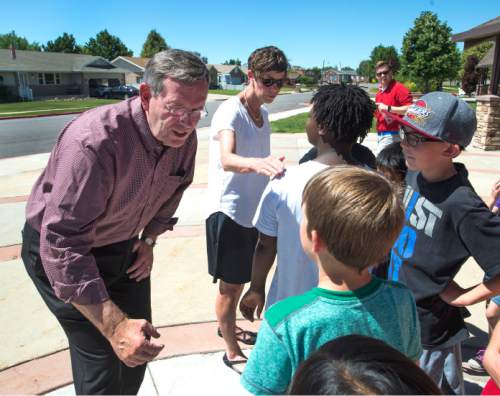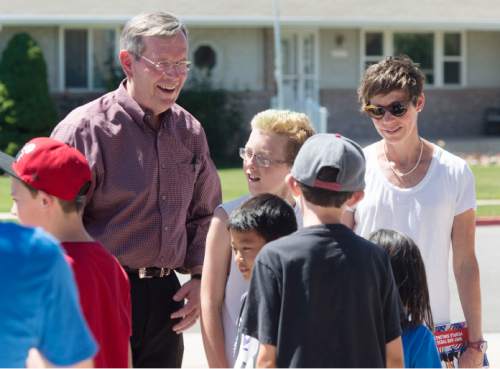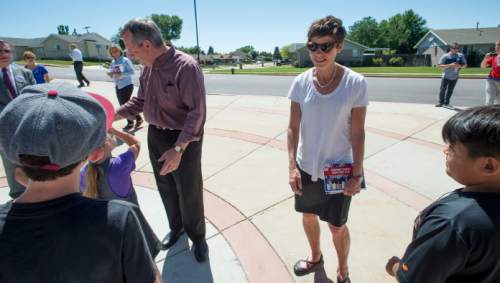This is an archived article that was published on sltrib.com in 2016, and information in the article may be outdated. It is provided only for personal research purposes and may not be reprinted.
For four legislative candidates in Utah County, their election fight thus far hasn't just been with their opponents, but with officials in their own county Republican Party.
That's because those four got on the primary ballot by gathering signatures under a new law in effect this year, prompting the party to not only disregard their candidacy, but to actively campaign against them.
Now, Count My Vote, the group that led the effort to create the signature path to the ballot in hopes of generating more primaries and greater public involvement is getting involved in the primary fight, coming to the aid of the four with mailers, money, Mike and Mitt.
Mike is Mike Leavitt, the former three-term Utah governor and Bush administration Cabinet secretary, who spent part of Friday knocking on doors in Utah County and Weber County neighborhoods — the first time he's gone door-to-door since he last ran for office in 2000.
And Mitt is former presidential candidate Mitt Romney, who is featured along with Leavitt and prominent businesswoman Gail Miller on campaign mailers now hitting voters' mailboxes, urging support for the four signature-gathering candidates.
"It's a very clear message that [Romney] is pleased these candidates are on the ballot and it's also a very clear point that the other candidates in these districts have vowed to eliminate that choice," Leavitt said. "They have committed that they will eliminate the system that brought them competition. Now how self-serving is that?"
Utah County Republican Chairman Craig Frank said the party only considers candidates who went through the party convention — and not the signature-gathering route — as its nominees, and the party has an obligation to support them.
As a result, the county GOP has given money to help elect the convention candidates, sent out mailers of its own with the party's endorsement, made postings on websites and social media promoting the nominees, shared the party's voter lists and organized volunteers to knock on doors.
"I believe we're doing what has been done in previous elections. I believe that the responsibility of the party is to support its nominees," Frank said.
In Mike Brenny's House race against Cory Maloy, for example, the party sent out a mail piece that hits Brenny for having been registered as a Democrat until this year and not having voted in GOP primaries in the past.
"I just don't think that for the nomination [the party] should be selecting a candidate, energizing voters against a candidate and also donating money to a candidate," Brenny said. "I think their time and energy could be better spent helping [Republican Rep.] Mia Love against [Democrat] Doug Owens than to help my opponent against me in a Republican primary."
The party made the same charge about Xani Haynie missing Republican primaries. But, she said, there haven't been primaries in years. Now there are, and the voters she's talked to while knocking on doors have been happy to have them.
"I've actually had people give me hugs saying, 'You know what, I'm so glad I'm finally getting the opportunity to vote in a primary and finally having an opportunity to get a choice,'" she said. "That's what this is about. We're giving people the opportunity to vote and for their opinion to matter and they get a voice."
Leavitt said he feels strongly that getting more candidates on the ballot "gives people better choices and more choices means better government."
"I think people make better decisions than parties and I think it's inappropriate for the party to be campaigning against people who were legally placed on the ballot through a process prescribed by the Legislature," Leavitt said.
In addition to supporting Haynie and Brenny, Count My Vote is also campaigning for Dan Hemmert, who is running against Morgan Philpot for the seat formerly held by Sen. Al Jackson and Payson Mayor Rick Moore who is in a primary with Rep. Marc Roberts, R-Salem.
Leavitt then spent part of the afternoon at an event in Ogden for Weber County Commission candidate Caitlin Gochnour.
The former governor said the previous system put women at a particular disadvantage, one that is reflected in the makeup of the state Legislature where, of the 87 Republican members, just six are women.
"Just look at that and say, 'How do you explain that?'" he said. "I tell you how you explain it. Just look at the convention delegates. Fifty-six percent of the voters in the Utah Republican Party are women; 23 percent of the delegates are women. There's a system that discriminates against different groups because they're not represented."
It is the latest skirmish in a long-running clash between Count My Vote and the Republican Party.
Count My Vote was spearheading a ballot initiative in 2014 to do away with the party's nominating conventions and replace them with signature-gathering and a direct primary.
The group's concern was that the nominating conventions catered to the most zealous partisans, producing candidates who don't represent mainstream Utahns and drive down voter turnout.
Republican lawmakers, fearing the Count My Vote effort would be successful, passed SB54, a compromise measure that lets candidates choose whether to go to the nominating convention or collect signatures.
The party fought the change in court for months, eventually losing its legal battle, but adopted rules refusing to recognize candidates that don't go through the convention.
Leavitt said he's not sure those candidates who gathered signatures will win, but the outcome of the June 28 primaries doesn't change the significance of the Count My Vote reforms.
"The change happened. Capable candidates have used it to get on the ballot. If some of them get elected, some of them probably won't," he said. "Time will tell, but it matters less how many [win]. Only that the process exists."
Twitter: @RobertGehrke


